
Konstantin Sergeyevich Stanislavski was a seminal Soviet and Russian theatre practitioner. He was widely recognized as an outstanding character actor and the many productions that he directed garnered him a reputation as one of the leading theatre directors of his generation. His principal fame and influence, however, rests on his 'system' of actor training, preparation, and rehearsal technique.

Tolstoy, or Tolstoi, is a family of Russian gentry that acceded to the high aristocracy of the Russian Empire. The name Tolstoy is itself derived from the Russian adjective "толстый". They are the descendants of Andrey Kharitonovich Tolstoy, who moved from Chernigov to Moscow and served under Vasily II of Moscow in the 15th century. The "wild Tolstoys", as they were known in the high society of Imperial Russia, have left a lasting legacy in Russian politics, military history, literature, and fine arts.
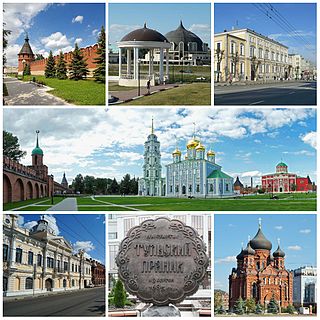
Tula is the largest city and the administrative center of Tula Oblast in Russia, located 193 kilometers (120 mi) south of Moscow. Tula is located in the north of the Central Russian Upland in Central Russia, on the banks of the Upa River, a tributary of the Oka. As of the 2010 Census, Tula had a population of 501,169, an increase from 481,216 in 2002, making it the 32nd largest city in Russia by population.

The Power of Darkness is a five-act drama by Leo Tolstoy. Written in 1886, the play's production was forbidden in Russia until 1902, mainly through the influence of Konstantin Pobedonostsev. In spite of the ban, the play was unofficially produced and read numerous times.

Stanislavski's system is a systematic approach to training actors that the Russian theatre practitioner Konstantin Stanislavski developed in the first half of the twentieth century. His system cultivates what he calls the "art of experiencing". It mobilises the actor's conscious thought and will in order to activate other, less-controllable psychological processes—such as emotional experience and subconscious behaviour—sympathetically and indirectly. In rehearsal, the actor searches for inner motives to justify action and the definition of what the character seeks to achieve at any given moment.

The Moscow Art Theatre was a theatre company in Moscow. It was founded in 1898 by the seminal Russian theatre practitioner Konstantin Stanislavski, together with the playwright and director Vladimir Nemirovich-Danchenko. It was conceived as a venue for naturalistic theatre, in contrast to the melodramas that were Russia's dominant form of theatre at the time. The theatre, the first to regularly put on shows implementing Stanislavski's system, proved hugely influential in the acting world and in the development of modern American theatre and drama.

Yasnaya Polyana is a writer's house museum, the former home of the writer Leo Tolstoy. It is 12 kilometres (7.5 mi) southwest of Tula, Russia, and 200 kilometres (120 mi) from Moscow.

This is a list of works by Russian writer Leo Tolstoy (1828–1910), including his novels, novellas, short stories, fables and parables, plays, and nonfiction.
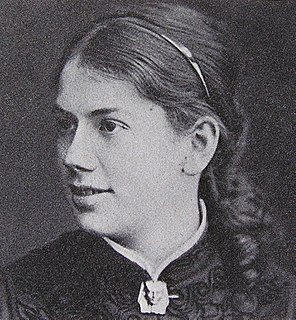
Countess Tatiana Lvovna Sukhotina-Tolstaya, was a Russian painter and memoirist. She is the second child and oldest daughter of writer Leo Tolstoy.

Count Lev Nikolayevich Tolstoy, usually referred to in English as Leo Tolstoy, was a Russian writer who is regarded as one of the greatest authors of all time. He received nominations for the Nobel Prize in Literature every year from 1902 to 1906 and for the Nobel Peace Prize in 1901, 1902, and 1909. That he never won is a major controversy.

The Moscow Art Theatre production of The Seagull in 1898, directed by Konstantin Stanislavski and Vladimir Nemirovich-Danchenko, was a crucial milestone for the fledgling theatre company that has been described as "one of the greatest events in the history of Russian theatre and one of the greatest new developments in the history of world drama." It was the first production in Moscow of Anton Chekhov's 1896 play The Seagull, though it had been performed with only moderate success in St. Petersburg two years earlier. Nemirovich, who was a friend of Chekhov's, overcame the writer's refusal to allow the play to appear in Moscow after its earlier lacklustre reception and convinced Stanislavski to direct the play for their innovative and newly founded Moscow Art Theatre (MAT). The production opened on 29 December [O.S. 17 December] 1898. The MAT's success was due to the fidelity of its delicate representation of everyday life, its intimate, ensemble playing, and the resonance of its mood of despondent uncertainty with the psychological disposition of the Russian intelligentsia of the time. To commemorate this historic production, which gave the MAT its sense of identity, the company to this day bears the seagull as its emblem.

A Provincial Lady is a one-act play by Ivan Turgenev. Written in 1850, it was first produced in January 1851 at a benefit performance for the seminal 19th-century Russian actor Mikhail Shchepkin at the Maly Theatre in Moscow.

Tsar Fyodor Ioannovich is a 1868 historical drama by Aleksey Konstantinovich Tolstoy. It is the second part of a trilogy that begins with The Death of Ivan the Terrible and concludes with Tsar Boris. All three plays were banned by the censor. Tsar Fyodor is written in blank verse and was influenced by the work of William Shakespeare, Casimir Delavigne, and Edward Bulwer-Lytton. It dramatises the story of Feodor I of Russia, whom the play portrays as a good man who is a weak, ineffectual ruler. The trilogy formed the core of Tolstoy's reputation as a writer in the Russia of his day and as a dramatist to this day. It has been considered Tolstoy's masterpiece.
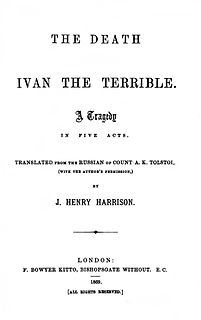
The Death of Ivan the Terrible is a historical drama by Aleksey Konstantinovich Tolstoy written in 1863 and first published in the January 1866 issue of Otechestvennye zapiski magazine. It is the first part of a trilogy that is followed by Tsar Fiodor Ioannovich and concludes with Tsar Boris. All three plays were banned by the censor. It dramatises the story of Ivan IV of Russia and is written in blank verse. Tolstoy was influenced by the work of William Shakespeare in writing the trilogy, which formed the core of his reputation as a writer in the Russia of his day and as a dramatist to this day.

Enough Stupidity in Every Wise Man is a five-act comedy by Aleksandr Ostrovsky. The play offers a satirical treatment of bigotry and charts the rise of a double-dealer who manipulates other people's vanities. It is Ostrovsky's best-known comedy in the West.
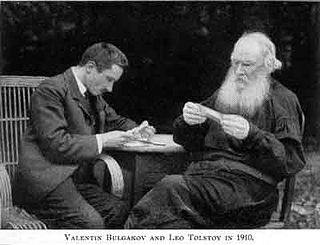
Valentin Fyodorovich Bulgakov was the last secretary of Leo Tolstoy and his biographer. He was director of a number of literary museums and was engaged in Tolstoyan, pacifist activities. He was imprisoned by the Tsarist regime and in an Nazi internment camp. During the final 20 years of his life he was head of the Yasnaya Polyana museum.
The Snow Maiden is a play in verse by Alexander Ostrovsky written in 1873 and first published in the September 1873 issue of Vestnik Evropy. It was adapted into an opera of the same name by Nikolai Rimsky-Korsakov, which premièred in 1882.
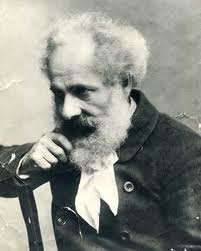
Nikolai Vasilyevich Orlov was a Russian genre painter and art teacher; associated with the Peredvizhniki and a friend of Leo Tolstoy.
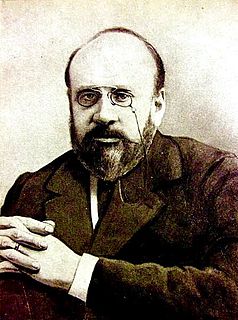
Count Sergei Lvovich Tolstoy was a composer and ethnomusicologist who was among the first Europeans to make an in-depth study of the music of India. He was also an associate of the Sufi mystic, Inayat Khan, and participated in helping the Doukhobors move to Canada.


















